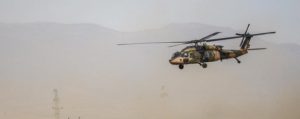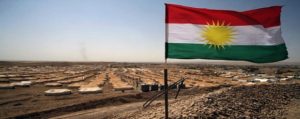![The autonomous region could become another proxy battlefield between Turkey and the UAE. [Getty]](https://www.imarmenian.com/avedis/wp-content/uploads/2020/07/The-autonomous-region-could-become-another-proxy-battlefield-between-Turkey-and-the-UAE.-Getty.jpg)
Iraqi Kurdistan fears entanglement in Turkey-UAE cold war
The autonomous region could become another proxy battlefield between Turkey and the UAE. [Getty]
Paul Iddon – Date of publication: 7 July, 2020
Amid Turkey’s latest military operations against the Kurdistan Workers’ Party (PKK) in Iraqi Kurdistan, it’s been suggested that the autonomous region could become another proxy battlefield in the increasingly dangerous multi-front cold war between Turkey and the United Arab Emirates (UAE).
If history is any indication, however, authorities in Iraqi Kurdistan will most likely seek to prevent their region from becoming entangled in a regional cold war.
In mid-June, the Turkish military launched the ongoing Operation Claw-Eagle against the PKK in Iraqi Kurdistan, which has seen Turkish airstrikes target the group across the region and kill some civilians in the process.
This latest Turkish operation came amid purported secret Emirati funding of the PKK in Iraqi Kurdistan according to an exclusive report by The New Arab’s Arabic language service.
The Kurdistan Regional Government (KRG), the report claimed, responded by promptly restricting money transfers from the UAE, demonstrating its opposition to any foreign funding of such groups.
Iraqi Kurdistan maintains relatively good relations with its neighbour Turkey and the UAE and, therefore, would strenuously oppose the latter country financing the PKK’s fight against the former.
The autonomous region could become another proxy battlefield in the increasingly dangerous multi-front cold war between Turkey and the UAE
After all, such a move could well escalate and prolong the four-decade-old Turkish-PKK conflict much to the detriment of the stability and security of Iraqi Kurdistan, where the vast majority of the clashes between the two adversaries are now taking place. Most Iraqi Kurds oppose their territory being used as a battlefield between Turkey and the PKK and simply want to live in peace.
More generally, the KRG has always sought to avoid becoming a site for any proxy conflicts in the region. In 2016, Iran claimed the Saudi consulate in Iraqi Kurdistan’s capital Erbil was funding the Iranian opposition Kurdistan Democratic Party of Iran (KDPI) group. The KRG adamantly denied that charge.
Such unfounded allegations invariably lack validity considering the demonstrable fact that the KRG has consistently opposed armed groups using its territory for armed campaigns against Iran.
For example, former Iraqi Kurdish President Masoud Barzani exerted great diplomatic efforts to bring a prompt end to past clashes between Iran and the Free Life for Kurdistan Party (PJAK) group – which has also fought Iran’s regime – and stabilise the Iraqi Kurdistan-Iran border.
Even though Iraqi Kurdistan has long maintained good relations with the United States, it has refused to take any side in US-Iran tensions.
In 2007, US special forces raided the Iranian consulate in Erbil and ransacked it, claiming Iran was organising insurgent attacks against US troops in Iraq from there. Barzani bitterly denounced that American action, insisting that the KRG would never allow Erbil to become a place that would tolerate such plots.

More generally, the Kurds oppose Iraq becoming a battleground between Iran and the US. Iraq’s President Barham Salih, himself a Kurd, has repeatedly pointed out that Kurds and Arabs have to live in Iraq and, therefore, don’t want to see it once again becoming a dangerous war zone.
The Kurdistan Regional Government has always sought to avoid becoming a site for any proxy conflicts in the region
“Don’t overburden Iraq with your own issues,” he urged the US back in February 2019. “The US is a major power … but do not pursue your own policy priorities, we live here,” he said. “It is of fundamental interest for Iraq to have good relations with Iran” and its other neighbours. For the Kurds, this doesn’t necessarily mean letting themselves become a vassal or powerless proxy of any of their neighbours.
For example, they pushed ahead with their September 2017 independence referendum despite opposition and warnings from all their neighbours and Baghdad. In a 2017 interview with the Saudi Okaz newspaper, Barzani stressed that Kurdistan wants to maintain good neighbourly relations with Iran but added that he would never allow Erbil to become dominated by Tehran as some Arab capitals have. All of this is consistently in line with the KRG’s wholly defensive posture in the region.
Another reason Iraqi Kurdistan would oppose the UAE, or any other outside power, funding PKK activities in its region is the simple fact that it, and most of its residents, want to see an end to Turkish-PKK clashes there. After all, these clashes kill and injure Iraqi Kurdish civilians, damage infrastructure and have emptied hundreds of villages and left farms and vast swathes of agricultural land unusable.
In an interview with the Turkish press back in 2003, when Ankara contemplated sending 70,000 troops into Iraqi Kurdistan, Barzani pointed out that his party’s Peshmerga fighters had made large sacrifices in fighting the PKK in past attempts at removing the group from Iraqi Kurdistan.
“We paid blood so the Turkish authorities would trust us,” Barzani said at the time, arguing that, “if after sacrificing 3,000 martyrs in the fight against the PKK some people in Turkey still think we are enemies this is catastrophic.”
In light of this record, it’s extremely unlikely that the KRG would knowingly allow any outside power to fund groups like the PKK for use as pawns in the region’s proxy wars since it knows all too well, from bitter experience, that the cost for it and its people would be too great.
Paul Iddon is a freelance journalist based in Erbil, Iraqi Kurdistan, who writes about Middle East affairs.

